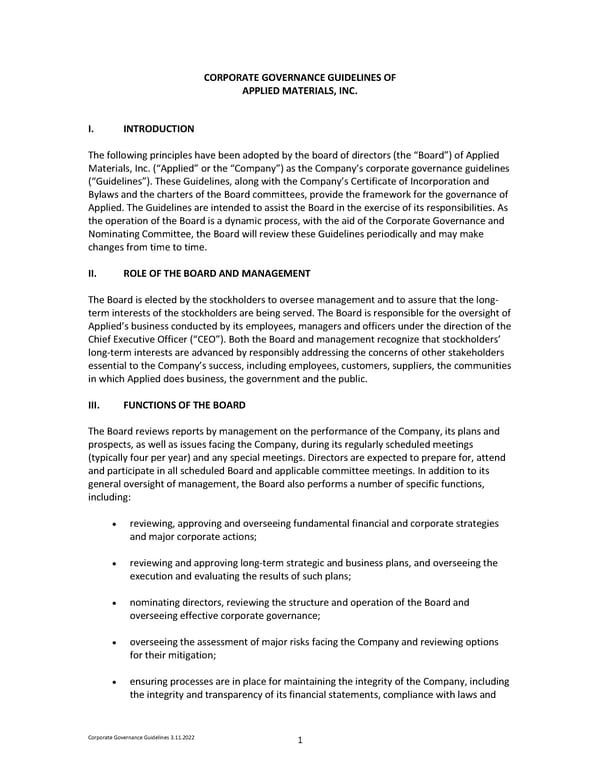Corporate Governance Guidelines Core
CORPORATE GOVERNANCE GUIDELINES OF APPLIED MATERIALS, INC. I. INTRODUCTION The following principles have been adopted by the board of directors (the “Board”) of Applied Materials, Inc. (“Applied” or the “Company”) as the Company’s corporate governance guidelines (“Guidelines”). These Guidelines, along with the Company’s Certificate of Incorporation and Bylaws and the charters of the Board committees, provide the framework for the governance of Applied. The Guidelines are intended to assist the Board in the exercise of its responsibilities. As the operation of the Board is a dynamic process, with the aid of the Corporate Governance and Nominating Committee, the Board will review these Guidelines periodically and may make changes from time to time. II. ROLE OF THE BOARD AND MANAGEMENT The Board is elected by the stockholders to oversee management and to assure that the long- term interests of the stockholders are being served. The Board is responsible for the oversight of Applied’s business conducted by its employees, managers and officers under the direction of the Chief Executive Officer (“CEO”). Both the Board and management recognize that stockholders’ long-term interests are advanced by responsibly addressing the concerns of other stakeholders essential to the Company’s success, including employees, customers, suppliers, the communities in which Applied does business, the government and the public. III. FUNCTIONS OF THE BOARD The Board reviews reports by management on the performance of the Company, its plans and prospects, as well as issues facing the Company, during its regularly scheduled meetings (typically four per year) and any special meetings. Directors are expected to prepare for, attend and participate in all scheduled Board and applicable committee meetings. In addition to its general oversight of management, the Board also performs a number of specific functions, including: • reviewing, approving and overseeing fundamental financial and corporate strategies and major corporate actions; • reviewing and approving long-term strategic and business plans, and overseeing the execution and evaluating the results of such plans; • nominating directors, reviewing the structure and operation of the Board and overseeing effective corporate governance; • overseeing the assessment of major risks facing the Company and reviewing options for their mitigation; • ensuring processes are in place for maintaining the integrity of the Company, including the integrity and transparency of its financial statements, compliance with laws and Corporate Governance Guidelines 3.11.2022 1
 Corporate Governance Guidelines Core Page 2
Corporate Governance Guidelines Core Page 2